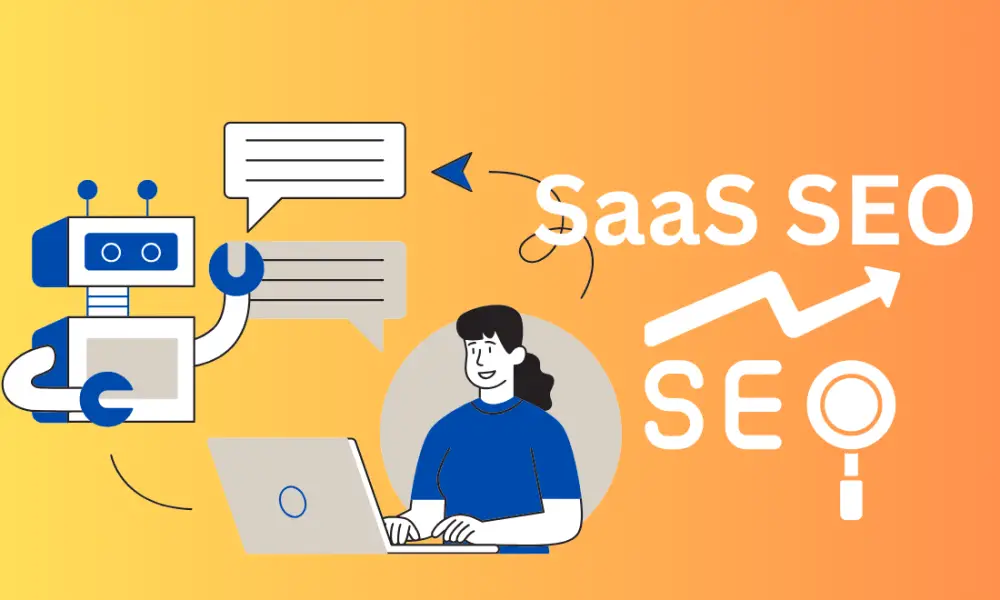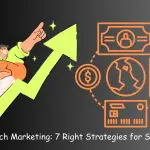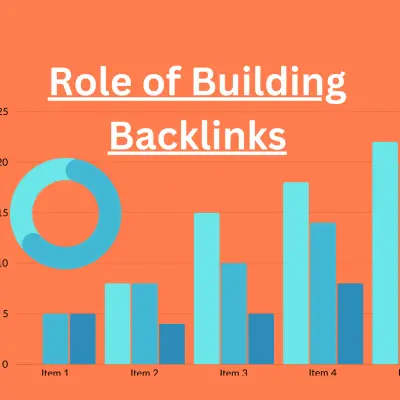SaaS SEO Strategies: Enhance Your Online Visibility – Right Now
Have you ever noticed how some SaaS companies always seem to pop up first when you’re searching online? It’s not luck; it’s smart SEO!
In this blog post, we’re going to explore how SaaS companies use simple yet effective strategies to stand out in the crowd. Get ready to boost your online visibility and leave your competition!
| SaaS SEO Strategies | Effectiveness Increase (%) | |
| 1 | On-Page Optimization | 30% |
| 2 | Local SEO | 60% |
| 3 | Keyword Research | 80% |
| 4 | High-Quality Content | 85% |
| 5 | Link Building | 90% |
| 6 | Mobile Optimization | 95% |
| 7 | User Experience (UX) Optimization | 97% |
| 8 | Technical SEO | 98% |
| 9 | Analytics & Monitoring | 99% |
| 10 | Continuous Improvement | 100% |
What Is Saas SEO?
| SaaS SEO, short for Software as a Service Search Engine Optimization, refers to the strategic process of optimizing the online presence of SaaS (Software as a Service) companies to enhance their visibility in search engine results pages (SERPs). It involves a range of techniques and tactics aimed at improving the organic search rankings of a SaaS platform, ultimately driving more qualified traffic and leads to the business. |
Important Features of SaaS SEO:
🟠 Keyword Research
🟠 On-Page Optimization
🟠 Off-Page Optimization
🟠 Content Creation
🟠 Technical SEO
🟠 Local SEO
🟠Analytics & Monitoring
🟠 Continuous Improvement
These features collectively form the foundation of SaaS SEO, helping SaaS companies increase their online visibility, attract more qualified leads, and drive growth in a competitive digital marketplace.
Why SaaS SEO Is Distinctive?
SaaS (Software as a Service) SEO stands out as a unique and dynamic field.
Unlike traditional SEO practices, SaaS SEO comes with its own set of challenges and nuances that require specialized strategies and approaches.
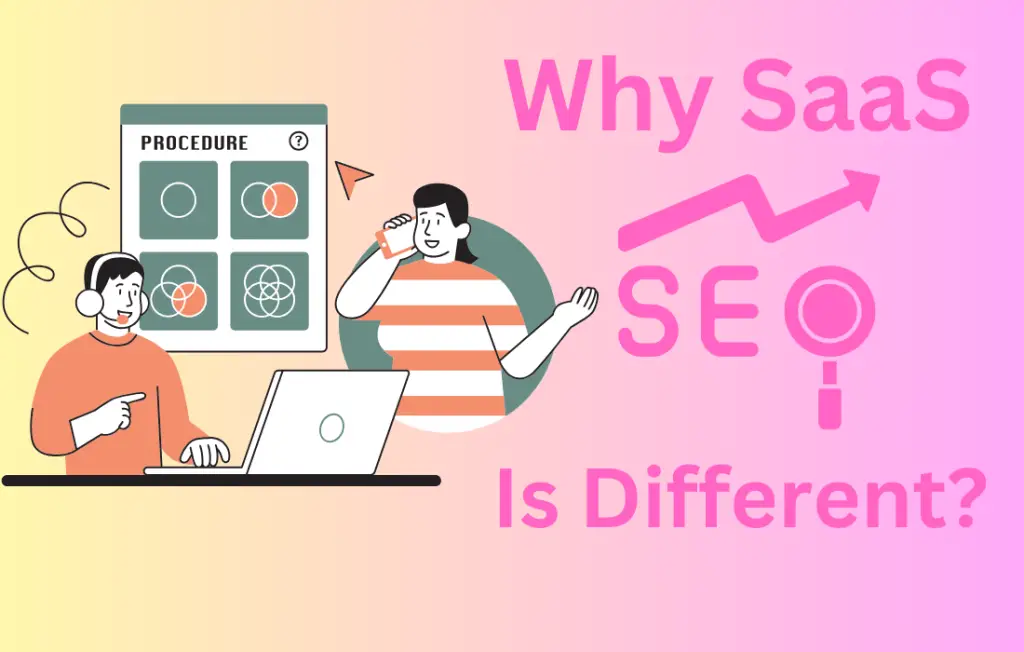
Here’s why SaaS SEO is different:
🟠Complexity of SaaS Offerings:
SaaS products often boast intricate functionalities and features, catering to diverse user needs.
This complexity poses a challenge in terms of keyword targeting and content optimization, as SaaS companies must effectively communicate the value proposition of their offerings while addressing the varied requirements of their target audience.
🟠Subscription-Based Model:
Unlike one-time purchases, SaaS operates on a subscription-based model, where customer retention is just as crucial as acquisition.
This necessitates a focus on long-term SEO strategies aimed at nurturing customer relationships, fostering loyalty, and minimizing churn rates.
🟠Continuous Updates and Releases:
SaaS platforms undergo regular updates, feature enhancements, and new releases to stay competitive and meet evolving user demands.
Consequently, SEO efforts must align with these changes, ensuring that the website remains optimized for relevant keywords and search queries associated with updated product features.
🟠Trial Conversions and Free Trials:
Many SaaS companies offer free trials or freemium models to attract potential customers.
While these initiatives can drive traffic and lead generation, they also require tailored SEO strategies to optimize landing pages, encourage trial sign-ups, and facilitate seamless user experiences throughout the trial period.
🟠Focus on Education and Thought Leadership:
SaaS customers often seek comprehensive resources, tutorials, and educational content to maximize the value of their subscriptions.
Therefore, SaaS SEO involves not only promoting the product but also establishing the company as a trusted source of industry insights, thought leadership, and best practices.
🟠Competitive Platform:
The SaaS market is highly competitive, with numerous players vying for attention in various niche segments.
Effective SaaS SEO requires in-depth competitor analysis, differentiation strategies, and constant innovation to stand out amidst the competition and capture market share.
The Advantages of SEO for SaaS Businesses



Search Engine Optimization (SEO) is a pivotal component of any successful digital marketing strategy, and for Software as a Service (SaaS) businesses, it offers a multitude of unique advantages.
Here’s why investing in SEO can be particularly advantageous for SaaS companies:
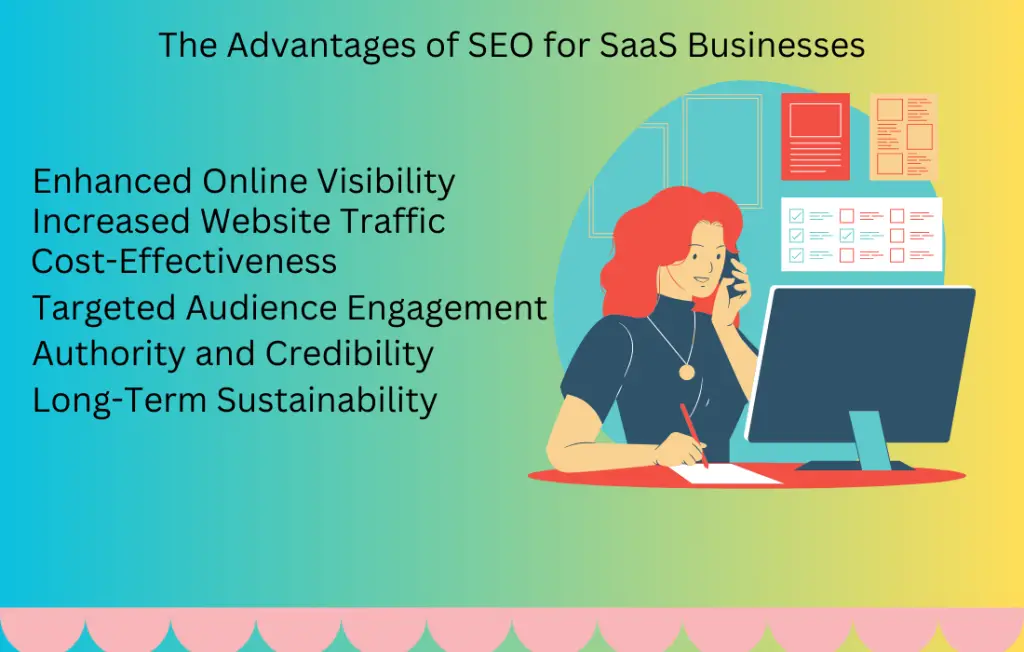
🟠Enhanced Online Visibility:
SEO enables SaaS businesses to improve their search engine rankings, ensuring that their products and services are prominently displayed to potential customers when they search for relevant keywords or phrases.
By appearing at the top of search results, SaaS companies can significantly increase their online visibility and attract more qualified leads.
🟠Increased Website Traffic:
Higher search engine rankings translate into increased organic traffic to the SaaS company’s website. This influx of traffic consists of users actively seeking solutions that the SaaS product offers, making them more likely to convert into paying customers or subscribers.
Additionally, SEO helps in driving consistent, sustainable traffic over time, reducing reliance on paid advertising channels.
🟠Cost-Effectiveness:
Compared to traditional outbound marketing tactics such as cold calling or print advertisements, SEO offers a more cost-effective means of acquiring leads and customers for SaaS businesses.
Once a SaaS company achieves high search engine rankings for relevant keywords, the ongoing traffic generated through organic search is essentially free, leading to a higher return on investment (ROI) over the long term.
🟠Targeted Audience Engagement:
SEO allows SaaS companies to target specific audiences based on their search intent and behavior. By optimizing website content and keywords to align with the needs and pain points of their target market, SaaS businesses can attract highly relevant traffic that is more likely to convert into paying customers.
This targeted approach results in higher conversion rates and improved overall marketing effectiveness.
🟠Authority and Credibility:
Ranking high in search engine results instills trust and credibility in the minds of potential customers. SaaS companies that appear at the top of search results are perceived as industry leaders and experts in their respective fields.
This perceived authority not only attracts more visitors to the website but also increases the likelihood of conversion, as customers are more inclined to trust and purchase from reputable brands.
🟠Long-Term Sustainability:
Unlike temporary marketing campaigns or paid advertisements that stop generating results once the budget runs out, the benefits of SEO are long-lasting and sustainable.
By consistently investing in SEO efforts, SaaS companies can build a solid foundation for long-term growth, establishing themselves as market leaders and maintaining a competitive edge in their industry.
A Five-Step SaaS SEO Strategy




Developing an effective SEO strategy is crucial for SaaS (Software as a Service) businesses looking to increase their online visibility, attract qualified leads, and drive growth.
Here’s a five-step roadmap to help SaaS companies navigate the complexities of SEO and achieve their marketing goals:
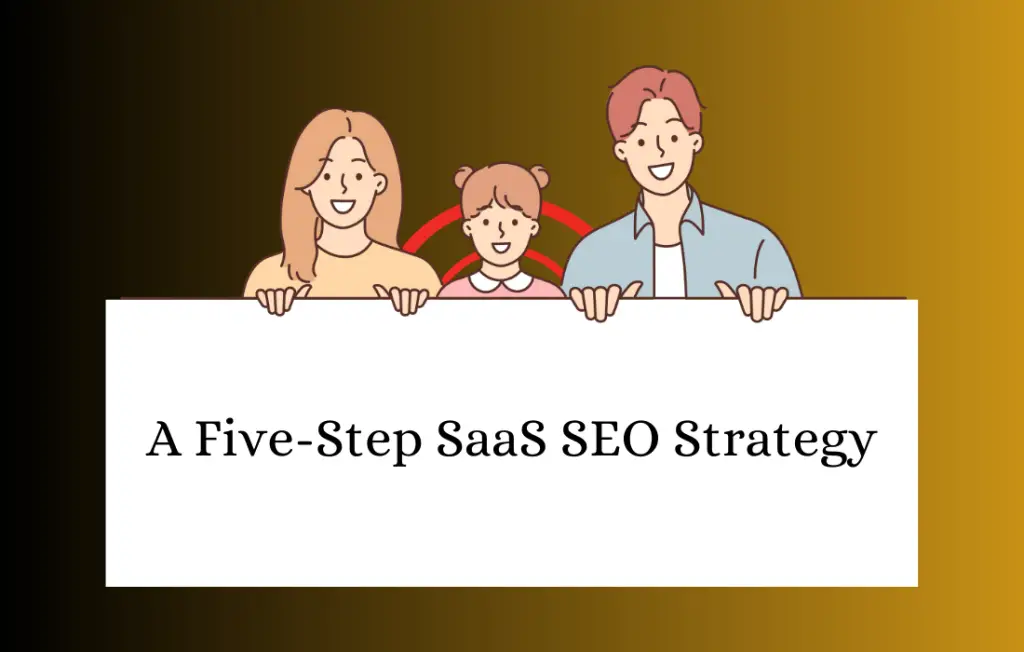
🟠 Conduct Comprehensive Keyword Research:
- Begin by identifying relevant keywords and phrases that your target audience is likely to use when searching for solutions that your SaaS product offers.
- Use keyword research tools like Google Keyword Planner, SEMrush, or Ahrefs to uncover high-volume, low-competition keywords specific to your industry and niche.
- Prioritize long-tail keywords that reflect user intent and address specific pain points, as they often yield higher conversion rates.
🟠 Optimize On-Page Elements:
- Optimize key on-page elements such as title tags, meta descriptions, headings (H1, H2, H3), and URLs to include target keywords and accurately describe the content of each page.
- Ensure that your website’s navigation structure is user-friendly and intuitive, making it easy for visitors and search engine crawlers to navigate through your site.
- Create high-quality, relevant content that provides value to your audience and incorporates targeted keywords naturally within the body of the text.
🟠 Focus on Technical SEO:
- Pay attention to technical aspects of SEO, including website speed, mobile responsiveness, and crawlability.
- Optimize images by compressing file sizes and using descriptive alt text to improve accessibility and enhance user experience.
- Implement schema markup to provide search engines with additional context about your content, helping them understand the relevance and significance of your pages.
🟠 Build Quality Backlinks:
- Acquire high-quality backlinks from authoritative websites within your industry through guest blogging, influencer outreach, and content partnerships.
- Focus on earning natural, editorially-earned backlinks by creating valuable content that others in your industry are eager to reference and share.
- Monitor your backlink profile regularly using tools like Moz or Majestic to identify and disavow any spammy or low-quality links that could negatively impact your website’s SEO performance.
🟠 Analyze, Iterate, and Improve:
- Regularly monitor and analyze key SEO metrics such as keyword rankings, organic traffic, and conversion rates using tools like Google Analytics and Google Search Console.
- Use the insights gained from data analysis to identify areas for improvement and refine your SEO strategy accordingly.
- Stay up-to-date with the latest SEO trends, algorithm updates, and industry best practices to ensure that your SaaS SEO strategy remains effective and competitive.
By following these five steps and continuously iterating on your SaaS SEO strategy, you can establish a strong online presence, attract more qualified leads, and drive sustainable growth for your SaaS business.
Creating Your Own SaaS SEO Strategy: Step-By-Step
Crafting a robust SEO strategy is essential for SaaS (Software as a Service) businesses looking to thrive in the digital landscape.
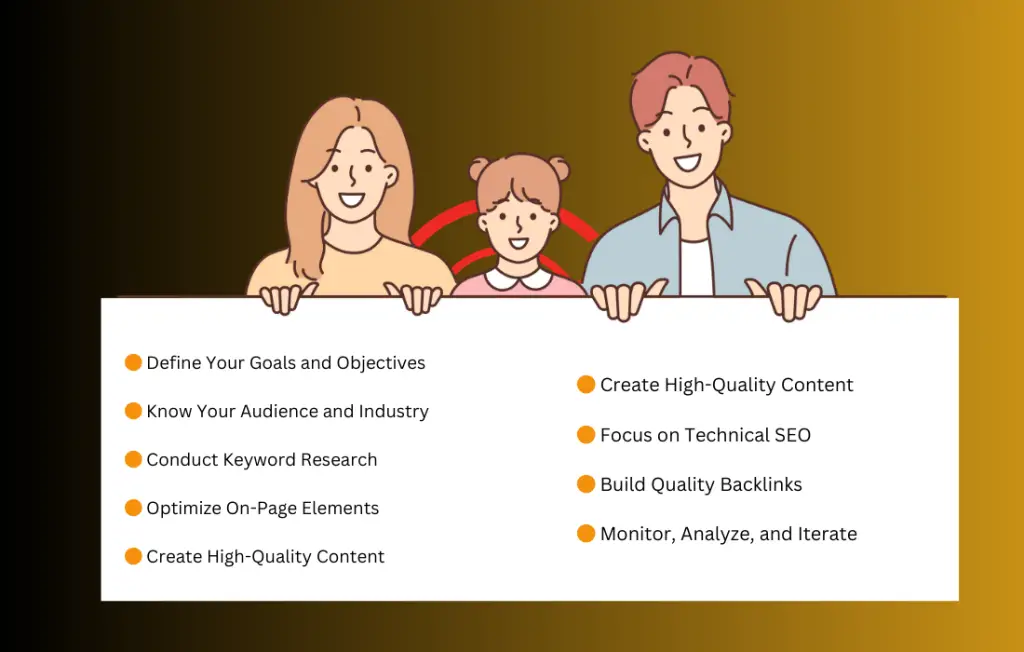
Here’s a step-by-step guide to help you develop your own SaaS SEO strategy and achieve success:
🟠 Define Your Goals and Objectives
🟠 Know Your Audience and Industry
🟠 Conduct Keyword Research
🟠 Optimize On-Page Elements
🟠 Create High-Quality Content
🟠 Focus on Technical SEO
🟠 Build Quality Backlinks
🟠 Monitor, Analyze, and Iterate
By following these step-by-step guidelines and focusing them to suit your specific business needs, you can create a comprehensive SaaS SEO strategy that drives meaningful results and propels your SaaS business to new heights of success.
FAQs
| What exactly is SaaS SEO, and why is it important for SaaS businesses? SaaS SEO refers to the strategic process of optimizing a SaaS company’s online presence to improve its visibility in search engine results pages (SERPs), ultimately attracting more qualified leads and customers. It’s crucial for SaaS businesses because it helps them stand out in a competitive market and drive growth by increasing their online visibility. |
| How does SaaS SEO differ from traditional SEO practices? SaaS SEO is tailored to the unique needs and offerings of software-based businesses, focusing on aspects such as subscription-based models, continuous updates and releases, and the emphasis on education and thought leadership. Unlike traditional SEO, which may focus on promoting specific products or services, SaaS SEO aims to highlight the value proposition of the SaaS platform as a whole. |
| What are some key strategies involved in SaaS SEO? Important strategies in SaaS SEO include comprehensive keyword research, on-page optimization, technical SEO, content creation, backlink building, analytics and monitoring, and continuous improvement. Each of these strategies plays a crucial role in enhancing the online visibility and search rankings of a SaaS platform. |
| How can SaaS companies identify the right keywords for their SEO efforts? SaaS companies can use keyword research tools like Google Keyword Planner, SEMrush, or Ahrefs to identify relevant keywords and phrases related to their products or services. It’s essential to consider factors such as search volume, competition, and search intent when selecting keywords to target in SEO campaigns. |
| What role does content play in SaaS SEO? Content is a cornerstone of SaaS SEO, serving as a means to attract organic traffic, establish authority and credibility, and educate potential customers. SaaS companies should focus on creating high-quality, informative content that addresses user needs and showcases their expertise in the industry. |
| How can SaaS businesses measure the effectiveness of their SEO efforts? SaaS businesses can measure the effectiveness of their SEO efforts by tracking key metrics such as keyword rankings, organic traffic, conversion rates, and backlink profile. Tools like Google Analytics and Google Search Console provide valuable insights into SEO performance and help identify areas for improvement. |
| What are some common challenges faced by SaaS businesses in implementing SEO strategies? Some common challenges include the complexity of SaaS offerings, competition in the market, keeping up with algorithm updates, and balancing short-term results with long-term sustainability. Overcoming these challenges requires a comprehensive understanding of SaaS SEO best practices and a willingness to adapt and iterate on strategies over time. |
Conclusion:
In conclusion, SaaS SEO is a multifaceted endeavor that requires careful planning, execution, and ongoing refinement. As SaaS businesses continue to proliferate and compete in the digital world, the importance of SEO as a fundamental growth driver cannot be overstated.
By following the strategies outlined in this guide and addressing the FAQs provided, SaaS companies can establish a strong online presence, attract more qualified leads, and drive sustainable growth over time. From conducting comprehensive keyword research to optimizing website content, technical elements, and building quality backlinks, each aspect of SaaS SEO plays a vital role in enhancing visibility and driving organic traffic.
Furthermore, embracing a data-driven approach and continuously monitoring key metrics allows SaaS businesses to assess the effectiveness of their SEO efforts and make informed decisions for optimization. It’s essential to stay agile, adapt to evolving search engine algorithms, and remain committed to providing value to users through high-quality content and exceptional user experiences.
Are you involved in digital marketing within the SaaS sector? What do you believe sets this industry apart and presents unique challenges and opportunities for marketers?

